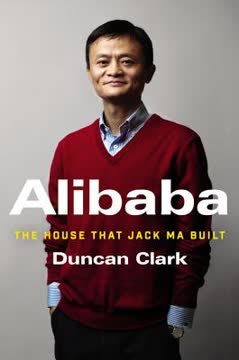Key Takeaways
1. Jeff Bezos's vision transformed e-commerce and redefined customer-centric business
"We want to be Earth's most customer-centric company where people can find and discover anything they want to buy online."
Bezos's customer-first philosophy drove Amazon's development from the beginning. He focused on creating a seamless online shopping experience, prioritizing features like customer reviews, personalized recommendations, and one-click ordering. This approach helped Amazon build trust with customers and gain a competitive edge.
Key innovations included:
- A vast selection of products
- Competitive pricing
- Fast, reliable shipping
- User-friendly website design
- Customer-generated content (reviews, ratings)
By consistently putting customers first, even at the expense of short-term profits, Bezos created a loyal customer base and positioned Amazon as the go-to destination for online shopping.
2. Amazon's early growth was fueled by Bezos's "Get Big Fast" strategy and relentless innovation
"Work hard, have fun, make history."
Rapid expansion and innovation characterized Amazon's early years. Bezos prioritized growth over profitability, reinvesting heavily in the company to capture market share and build infrastructure. This strategy allowed Amazon to quickly become the dominant player in online bookselling and later expand into other product categories.
Key elements of the "Get Big Fast" strategy:
- Aggressive marketing and customer acquisition
- Continuous improvement of the website and user experience
- Rapid expansion of product offerings
- Building large, efficient distribution centers
- Strategic acquisitions and partnerships
Bezos's willingness to take risks and invest in long-term growth, even in the face of skepticism from Wall Street, laid the foundation for Amazon's future success.
3. The company's focus on long-term thinking and willingness to experiment set it apart
"We are willing to be misunderstood for long periods of time."
Long-term vision and experimentation were key to Amazon's success. Bezos encouraged a culture of innovation and was willing to invest in ideas that might not pay off for years. This approach allowed Amazon to pioneer new technologies and business models that would later become industry standards.
Examples of long-term thinking and experimentation:
- Development of the Kindle e-reader
- Creation of Amazon Web Services
- Introduction of Amazon Prime membership
- Exploration of drone delivery and cashier-less stores
By focusing on long-term value creation rather than short-term profits, Amazon was able to build sustainable competitive advantages and disrupt multiple industries.
4. Amazon's success was built on Bezos's ability to identify and exploit new market opportunities
"Your margin is my opportunity."
Bezos's keen market insight allowed Amazon to expand far beyond its original focus on books. He consistently identified areas where traditional retail models were inefficient or customer experiences were subpar, then leveraged Amazon's technology and customer base to create better solutions.
Key market expansions:
- Music and video sales
- Electronics and computer products
- Clothing and accessories
- Grocery delivery (Amazon Fresh)
- Streaming media (Prime Video)
By entering new markets with a customer-centric approach and leveraging its existing infrastructure, Amazon was able to quickly gain market share and disrupt established players.
5. The Kindle revolutionized the book industry and positioned Amazon as a tech innovator
"It's time to change... I'm grumpy when I'm forced to read a physical book because it's not as convenient."
The Kindle e-reader represented a major shift in Amazon's strategy, moving the company from purely a retailer to a hardware manufacturer and digital content provider. Bezos recognized the potential for e-books to transform the publishing industry and positioned Amazon to lead that transformation.
Key aspects of the Kindle strategy:
- Developing user-friendly hardware
- Building a vast digital book catalog
- Pricing e-books aggressively to drive adoption
- Integrating Kindle with Amazon's existing e-commerce platform
The success of the Kindle reinforced Amazon's reputation for innovation and helped the company maintain its dominance in the book market as it transitioned from physical to digital formats.
6. Amazon Web Services emerged as a game-changing cloud computing platform
"It has the potential to be as big as our retail business."
AWS's development showcased Amazon's ability to turn internal capabilities into new business opportunities. By offering its cloud computing infrastructure to other companies, Amazon created a highly profitable new revenue stream and positioned itself at the forefront of a rapidly growing industry.
Key factors in AWS's success:
- Leveraging Amazon's existing technology expertise
- Offering flexible, scalable solutions for businesses of all sizes
- Continuous innovation and expansion of services
- Aggressive pricing to gain market share
AWS's success demonstrated Amazon's ability to innovate beyond its core retail business and create entirely new markets.
7. Bezos's management style combines visionary thinking with intense focus on execution
"I believe you have to be willing to be misunderstood if you're going to innovate."
Bezos's leadership approach balances big-picture thinking with attention to detail. He sets ambitious goals for the company while also remaining deeply involved in day-to-day operations and product development. This hands-on style has been crucial to Amazon's ability to execute on its vision.
Key aspects of Bezos's management style:
- Encouraging a culture of innovation and risk-taking
- Maintaining a "Day 1" mentality to avoid complacency
- Using data-driven decision making
- Focusing on key metrics and operational excellence
- Demanding high standards from employees
Bezos's unique blend of visionary leadership and operational focus has been a key driver of Amazon's success and ability to maintain its innovative edge as it has grown.
8. Amazon's culture of frugality and customer obsession became integral to its success
"We're putting a stake in the ground: We're going to become profitable."
Frugality and customer focus were core values that Bezos instilled in Amazon's culture from the beginning. These principles helped the company weather difficult times, such as the dot-com crash, and maintain its competitive edge as it grew.
Key elements of Amazon's culture:
- Emphasis on operational efficiency and cost control
- Willingness to sacrifice short-term profits for long-term customer value
- "Two-pizza team" rule to maintain agility and creativity
- Customer-centric decision making at all levels of the organization
- Continuous improvement and innovation
By embedding these values deeply into its culture, Amazon was able to maintain its startup mentality and customer focus even as it grew into a global corporation.
9. The company's expansion beyond books challenged traditional retail models
"Amazon.com is not going to put bookstores out of business."
Amazon's expansion into new product categories and its innovative approach to retail fundamentally changed the industry landscape. While Bezos initially claimed Amazon wouldn't threaten traditional bookstores, the company's growth and efficiency ultimately posed significant challenges to brick-and-mortar retailers across various sectors.
Impact on traditional retail:
- Pressure on pricing and margins
- Shift in consumer shopping habits towards online
- Emphasis on convenience and selection
- Integration of online and offline retail experiences
- Disruption of supply chains and distribution models
Amazon's success forced traditional retailers to adapt or face decline, reshaping the entire retail industry in the process.
10. Bezos's space venture, Blue Origin, exemplifies his long-term vision and ambition
"We're working, patiently and step-by-step, to lower the cost of spaceflight so that many people can afford to go and so that we humans can better continue exploring the solar system."
Blue Origin represents Bezos's personal passion and his belief in pursuing ambitious, long-term goals. The company's mission to make space travel more accessible aligns with Bezos's broader philosophy of thinking big and working towards transformative change.
Key aspects of Blue Origin:
- Focus on reusable rocket technology
- Gradual, methodical approach to development
- Emphasis on safety and reliability
- Long-term vision of enabling human presence in space
- Potential for synergies with Amazon's logistics expertise
Blue Origin showcases Bezos's willingness to invest in high-risk, high-reward ventures that have the potential to reshape entire industries, much as Amazon did for retail and cloud computing.
Last updated:
FAQ
What's "One Click: Jeff Bezos and the Rise of Amazon.com" about?
- Biography and Business Growth: The book is a biography of Jeff Bezos and a detailed account of how he founded and grew Amazon.com into a global e-commerce giant.
- Entrepreneurial Journey: It covers Bezos's journey from his early life and career to his decision to start Amazon, highlighting his entrepreneurial spirit and innovative strategies.
- Amazon's Evolution: The book explores Amazon's evolution from an online bookstore to a diversified e-commerce platform, including its expansion into various product categories and services.
- Business Strategies: It delves into the business strategies and technological innovations that have driven Amazon's success, such as customer-centric approaches and the development of the Kindle.
Why should I read "One Click: Jeff Bezos and the Rise of Amazon.com"?
- Inspiration for Entrepreneurs: The book provides valuable insights into the mindset and strategies of one of the most successful entrepreneurs of our time, offering inspiration for aspiring business leaders.
- Understanding E-commerce: It offers a comprehensive look at the rise of e-commerce and how Amazon has shaped the industry, making it essential reading for anyone interested in online business.
- Lessons in Innovation: Readers can learn about the importance of innovation and adaptability in business, as demonstrated by Bezos's approach to challenges and opportunities.
- Insight into Leadership: The book provides a detailed look at Bezos's leadership style, including his focus on customer satisfaction and long-term thinking, which can be applied to various business contexts.
What are the key takeaways of "One Click: Jeff Bezos and the Rise of Amazon.com"?
- Customer Obsession: Bezos's relentless focus on customer satisfaction is a central theme, emphasizing the importance of understanding and meeting customer needs.
- Innovation and Risk-Taking: The book highlights the role of innovation and calculated risk-taking in Amazon's success, showcasing how Bezos embraced new technologies and business models.
- Long-Term Vision: Bezos's long-term vision and willingness to invest in future growth, even at the expense of short-term profits, are key factors in Amazon's rise.
- Adaptability and Resilience: The ability to adapt to changing market conditions and overcome challenges is a recurring lesson, as seen in Amazon's response to competition and market shifts.
How did Jeff Bezos come up with the idea for Amazon?
- Internet Growth: Bezos was inspired by the rapid growth of the Internet and saw an opportunity to leverage this new technology for retail.
- Product Selection: He chose books as the initial product due to their universal appeal, ease of shipping, and the vast number of titles available.
- Market Research: Bezos conducted thorough research, creating a list of potential products and analyzing market size, competition, and distribution channels.
- Regret Minimization Framework: He used a personal decision-making tool, the "regret minimization framework," to evaluate the risk of starting Amazon versus the potential regret of not pursuing the opportunity.
What role did innovation play in Amazon's success according to "One Click"?
- Technological Advancements: Innovation in technology, such as the development of the 1-Click ordering system, played a crucial role in enhancing customer experience and streamlining operations.
- Product Expansion: Amazon's ability to innovate and expand its product offerings beyond books to include music, electronics, and more was key to its growth.
- Kindle Development: The creation of the Kindle e-reader was a significant innovation that transformed the way people consume books and solidified Amazon's position in the digital content market.
- Web Services: The launch of Amazon Web Services (AWS) demonstrated innovation in cloud computing, providing a new revenue stream and supporting the growth of other businesses.
How did Jeff Bezos's leadership style contribute to Amazon's growth?
- Customer-Centric Approach: Bezos's leadership emphasized a strong focus on customer satisfaction, driving decisions that prioritized customer needs and experiences.
- High Hiring Standards: He maintained a high bar for hiring, ensuring that each new employee raised the overall talent level of the company.
- Frugality and Efficiency: Bezos promoted a culture of frugality and efficiency, encouraging cost-saving measures and resourcefulness among employees.
- Visionary Thinking: His long-term vision and willingness to invest in future growth, even at the expense of short-term profits, guided Amazon's strategic direction.
What challenges did Amazon face during its early years?
- Financial Losses: Amazon faced significant financial losses in its early years as it prioritized growth over profitability, leading to skepticism from investors.
- Competition: The company faced intense competition from established bookstore chains like Barnes & Noble and new online retailers.
- Logistical Challenges: Building an efficient distribution network and managing inventory were major challenges as Amazon expanded its product offerings.
- Market Skepticism: Many industry experts doubted the viability of Amazon's business model, questioning its ability to sustain growth and achieve profitability.
How did Amazon's business model evolve over time?
- Diversification: Amazon evolved from an online bookstore to a comprehensive e-commerce platform, offering a wide range of products and services.
- Digital Content: The introduction of the Kindle and digital content sales marked a significant shift towards digital media and content distribution.
- Cloud Computing: The development of Amazon Web Services (AWS) expanded the company's business model to include cloud computing and infrastructure services.
- Marketplace and Third-Party Sellers: Amazon's Marketplace allowed third-party sellers to offer products on the platform, increasing product variety and revenue streams.
What are some of the best quotes from "One Click" and what do they mean?
- "We know two percent today." This quote reflects Bezos's belief in the vast potential for growth and learning in e-commerce, emphasizing the importance of continuous innovation.
- "Get Big Fast." This mantra highlights Bezos's aggressive growth strategy, focusing on rapid expansion to capture market share and establish a dominant position.
- "It's always Day One." This philosophy underscores Bezos's commitment to maintaining a startup mentality, fostering innovation, and avoiding complacency.
- "You can invent your way out of any box." This quote illustrates Bezos's belief in the power of innovation and creativity to overcome challenges and drive success.
How did Amazon's approach to customer service set it apart from competitors?
- Customer Reviews: Allowing customers to post reviews, both positive and negative, built trust and transparency, setting Amazon apart from traditional retailers.
- Personalization: Amazon's recommendation system personalized the shopping experience, helping customers discover new products based on their preferences.
- Convenience: Features like 1-Click ordering and fast shipping options enhanced convenience, making Amazon a preferred choice for online shopping.
- Customer Feedback: Bezos valued customer feedback, using it to improve services and address issues, reinforcing Amazon's reputation for customer-centricity.
What impact did the Kindle have on the publishing industry?
- Digital Transformation: The Kindle accelerated the shift from physical books to digital formats, changing how books are consumed and distributed.
- Pricing Pressure: Amazon's pricing strategy for e-books put pressure on publishers to lower prices, affecting traditional revenue models.
- Self-Publishing: The Kindle platform enabled self-publishing, giving authors more control and access to a global audience without traditional publishing barriers.
- Market Leadership: The Kindle established Amazon as a leader in the e-book market, influencing the strategies of competitors and publishers.
What lessons can entrepreneurs learn from Jeff Bezos's journey as described in "One Click"?
- Vision and Persistence: Entrepreneurs can learn the importance of having a clear vision and the persistence to pursue it despite challenges and skepticism.
- Customer Focus: Prioritizing customer needs and experiences can drive business success and differentiate a company from its competitors.
- Innovation and Adaptability: Embracing innovation and being willing to adapt to changing market conditions are crucial for long-term growth and sustainability.
- Long-Term Thinking: Focusing on long-term goals rather than short-term profits can lead to more significant achievements and industry leadership.
Review Summary
One Click receives mixed reviews, with ratings ranging from 1 to 5 stars. Many readers find it informative but brief, offering a quick overview of Amazon's history and Jeff Bezos's life. Some praise its insights into Amazon's customer-centric approach and Bezos's business philosophy. However, critics note its lack of depth, outdated information, and occasionally negative tone. Several reviewers compare it unfavorably to more comprehensive books about Amazon. Despite its flaws, many readers still recommend it as a concise introduction to Amazon's story and Bezos's entrepreneurial journey.
Similar Books









Download PDF
Download EPUB
.epub digital book format is ideal for reading ebooks on phones, tablets, and e-readers.




